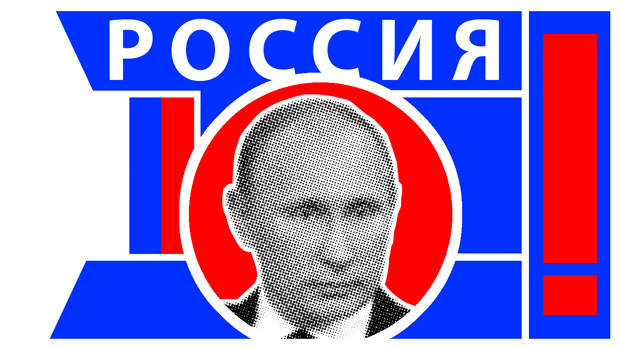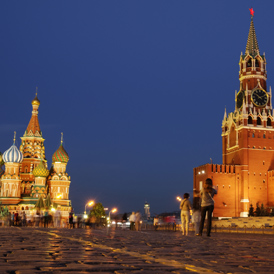What does the future hold for Russia?
Twenty years ago, Mikhail Gorbachev fell from power and the Soviet Union collapsed. This year, protests are sweeping Russia’s cities. Is Russia facing a moment of change? Channel 4 News investigates.

Throughout 1991, in the twilight days of the Soviet Union, there were tanks on the streets of Moscow.
Twenty years later, there are now musicians like Alexey Steblev.
On 10 December, he joined the other members of the New Russia Quartet on a balcony in Moscow, in the snow, to play as thousands protested peacefully below.
On Christmas Eve there were further protests in cities across Russia.
That in itself is a sign of how much things have changed in the 20 years since the years of turbulence and violence in Russia.
Mr Steblev, the cellist in the quartet, told Channel 4 News he joined the “fair vote” protest because he “can only hope for the best and try to help.”
People wanted to show and say quietly but audibly that their Russia isn’t the country of lies, mud, aggression, hate and cowardice. Cellist Alexey Steblev
“Even if everything was against this idea – it was about 0 Celsius, so instruments got immediately out of tune, fingers became icy; windy, so the music stands were going to fall down every second; but I’m happy we did it,” he said.
“People wanted to show and say quietly but audibly that their Russia isn’t the country of lies, mud, aggression, hate and cowardice. These people wanted to live honestly, sincerely, wanted their children to grow up among the beauty and benevolence, wanted their voices – and votes – to be heard and have meaning in the life of our country.”
Many in Russia and internationally believe now could be a key moment of change for Russia, epitomised by the protests. Christmas Day 2011 is twenty years on from the end of the Soviet Union, when Mikhail Gorbachev stepped down from power.
It’s also less than three months ahead of presidential elections in March 2012, in which Prime Minister Putin intends to run to take back his old job.
Former ambassador in Moscow, Sir Rodric Braithwaite, told Channel 4 News it is a big moment – but stressed that change takes a long time.
“I believe Russian politics is now on the move again,” he said.
A moment of change?
Many Russians agree things could be changing.
Human Rights Watch’s Moscow branch has compiled a list of leading figures in Russia’s civil society, a phenomenon which only really began to grow up after the Soviet Union passed into history. Despite threats under Mr Putin – in 2006, as president, he passed anti-NGO legislation – campaigners believe the civil society is now reaching maturity and sparking change.
Tanya Lokshina, HRW’s senior researcher in Russia, told Channel 4 News that the growth of the “vibrant and diverse” civil society was a key change since the end of the Soviet Union – and one which, alongside the recent protests, shows that the era of silence in Russia is over.
“The recent protests demonstrate without a shadow of doubt that the era of apathy, of silence, is over, which the government has to accept whether it wants to or not,” she said.
If the “era of silence” is ending in Russia, whether it will be replaced by an era of noise is another matter. It is worth remembering that, while support for Mr Putin’s party United Russia fell by around a third in the recent (allegedly rigged) elections, it still won close to 50 per cent of the votes.
A portrait of Russia's civil society - photo gallery
‘The economy, stupid’
To understand why Putin remains so popular when many outside Russia consider his regime to be oppressive and in some cases brutal, it is necessary to understand how much change his rule has brought since he came into power over a decade ago.
Rupert D’Cruz, a lawyer at Littleton Chambers with extensive experience of working in Russia, says Mr Putin’s popularity has to be seen in light of the chaos in Russia in the 1990s, after the end of the Soviet Union. While some exploited legal loopholes to get rich, others faced shortages and bread queues.
Mr D’Cruz said: “It left a scar, a huge scar of chaos. And when President Putin came into power, what he promised and brought about was stability after that chaos. He came in and took control – and that’s what he has traded on for the past 11 years and it’s worked until recently because as Bill Clinton said or James Carville – it’s the economy, stupid.”
While Russia’s economy has done well because of high oil prices rather than policies, it is still a major factor in Mr Putin’s favour. For many years he has enjoyed popularity ratings which leaders in the west could only dream of.
Watch the video: historian Orlando Figes on what has changed in Russia since 1991
‘Tactical mistake’
But as former ambassador Sir Rodric puts it, Mr Putin’s plan to effectively swap jobs with Mr Medvedev and take up the presidency again in 2012 is a “big tactical mistake”.
He told Channel 4 News: “That was one of the first things that happened that showed things were on the move, that announcement made everybody angry, and after that the trouble started.”
And trouble now is not what it once was, as leaders across the Arab world found out earlier this year. While it is not the only factor that made a difference in the Arab Spring, the rise of the internet and social media to spread opinion and organise dissent was a major driver.
Sir Rodric added: “There are more internet users in Russia than in Germany. You can’t stop people knowing what’s going on now.”
And what’s going in Russia over the past few years has got people’s attention – and made them consider breaking the political pact they effectively made with Mr Putin over a decade ago: give us stability and that’s what matters.
Allegedly rigged elections, mismanaged natural disaster like the 2010 fires, corrupt officials and a spread of protest captured on camera – as seen when Mr Putin was booed this year at a martial arts event – have combined with other serious daily worries.

HRW’s Ms Lokshina explains: “There is a feeling that if something happens to you, you are basically done for. If you are somehow in trouble with police and thrown in jail, the judicial system is not going to rescue you; if you fall seriously ill, the medical system has deteriorated; and the education system is so corrupt people don’t want their children to study in Russia any longer.”
Sir Rodric believes there is another factor which could lead to change.
“People have got bored with him, as always happens. Putin’s on the other side of the bell curve. All politicians go up, then down,” he told Channel 4 News.
But most experts believe US Senator John McCain’s tweet in December – “Dear Vlad, the Arab Spring is coming to a neighbourhood near you” – was hyperbolic.
Sir Rodric still thinks that Mr Putin will win March’s presidential election, although how he handles potential continued protests is an issue.
Russian historian Orlando Figes, professor of history at Birkbeck, told Channel 4 News the regime is both paranoid and jittery, but he does not believe violence will be the answer.
There is a feeling that if something happens to you, you are basically done for. HRW’s Tanya Lokshina
“It could use force but that is bound to be counter-productive. It’s more likely to use its influence in the mass media to portray the opposition as foreign spies, enemies of Russia…
“I suspect as we approach the presidential election, the influence of the mass media will have the effect of making ordinary people rally behind Putin as someone who maybe they don’t altogether love, but who is a figure of stability at a time when the mass media is presenting to them perhaps a return to all those conditions they’ve seen in the 1990s, of criminality, violence, dis-unity.”
But the real question is what comes after the March elections.
Read more: Acting up? Russian civil society at 20
Mr Figes said: “I’m not a betting man and as a historian I know that revolutions are unpredictable. But in this case I’m pretty sure Putin will be here in 2013. Whether he’s here in 2016, after the next elections, I’m rather more doubtful.”
So this could be the beginning of the end, or the beginning of a key period of change at least – but Sir Rodric told Channel 4 News what many forget is that Russia has been changing since the fall of the Soviet Union and before.
“Russia is changing but I have thought that since the 1980s – I also thought then it would take at least 70 years.
“The question to ask is, if we think things are changing, what is it that is happening now that has never happened before? All the other attempts at reform have failed…but now we have the opening up of the country, travel, internet, more freedom of the press, greater prosperity – albeit fragile because of the oil – I think all of those are long-term drivers of change.
“Russia has changed a huge amount already – and I assume there will be more.”